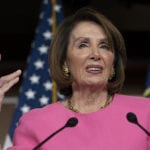 History
History  History
History  History
History 10 “Modern” Problems with Surprising Historical Analogs
 Health
Health 10 Everyday Activities That Secretly Alter Consciousness
 History
History Top 10 Historical Disasters Caused by Someone Calling in Sick
 Animals
Animals 10 New Shark Secrets That Recently Dropped
 Movies and TV
Movies and TV 10 Forgotten Realities of Early Live Television Broadcasts
 Technology
Technology 10 Stopgap Technologies That Became Industry Standards
 Weird Stuff
Weird Stuff 10 Wild Facts About Taxidermy That You Probably Didn’t Know
 Travel
Travel 10 Beautiful Travel Destinations (That Will Kill You)
 Miscellaneous
Miscellaneous 10 Modern Marriage Rituals Born from Corporate Branding
 History
History 10 Extreme Laws That Tried to Engineer Society
 History
History 10 “Modern” Problems with Surprising Historical Analogs
 Health
Health 10 Everyday Activities That Secretly Alter Consciousness
Who's Behind Listverse?

Jamie Frater
Head Editor
Jamie founded Listverse due to an insatiable desire to share fascinating, obscure, and bizarre facts. He has been a guest speaker on numerous national radio and television stations and is a five time published author.
More About Us History
History Top 10 Historical Disasters Caused by Someone Calling in Sick
 Animals
Animals 10 New Shark Secrets That Recently Dropped
 Movies and TV
Movies and TV 10 Forgotten Realities of Early Live Television Broadcasts
 Technology
Technology 10 Stopgap Technologies That Became Industry Standards
 Weird Stuff
Weird Stuff 10 Wild Facts About Taxidermy That You Probably Didn’t Know
 Travel
Travel 10 Beautiful Travel Destinations (That Will Kill You)
 Miscellaneous
Miscellaneous 10 Modern Marriage Rituals Born from Corporate Branding
10 Business Scandals So Big They Shook the Economy
We’ve witnessed some jaw-dropping business scandals that raised eyebrows and sent shockwaves through financial corridors. Picture this as an economic rollercoaster with twists, turns, and a fair share of ups and downs. So grab your seat belts as we ride through ten business scandals so big they shook the economy.
Related: 10 Scandalous Pyramid Schemes
10 Deepwater Horizon
The Deepwater Horizon oil rig disaster was an event that sent shockwaves through the business world, leaving an impact on the economy. In April 2010, an offshore drilling rig operated by BP suffered a blowout, leading to a massive oil spill in the Gulf of Mexico. The incident resulted in the loss of 11 lives and caused damage to marine life and coastal ecosystems.
At the heart of the scandal were oversights and negligence in safety procedures. The blowout preventer, a crucial safety device, failed to activate, allowing millions of barrels of oil to gush into the ocean for 87 days before the well was capped. The environmental fallout was devastating, with damage to fisheries, wildlife habitats, and the livelihoods of communities along the Gulf Coast.
BP faced immense public backlash, legal battles, and a significant financial toll. The company eventually pleaded guilty to criminal charges and agreed to pay billions in settlements and fines. The Deepwater Horizon disaster reminds us of the importance of corporate responsibility and the consequences that can arise from negligence in the pursuit of profit.
9 Lehman Brothers
In the mid-2000s, a financial storm was brewing. Lehman Brothers, a giant in the banking world, was at the heart of it. The scandal that rocked the economy was none other than the subprime housing crisis.
Lehman Brothers got tangled up in the subprime mortgage mess like many others. Banks were lending money to people who couldn’t afford it, particularly for homes. These were called subprime mortgages. Lehman Brothers invested heavily in these risky loans, thinking the housing market was invincible.
However, in 2008, the bubble burst. People couldn’t pay their mortgages, and the value of homes plummeted. Lehman Brothers faced a mountain of debt and, shockingly, filed for bankruptcy in September. This wasn’t just any bankruptcy. It was the largest in U.S. history at the time.
The Lehman Brothers collapse sent shockwaves through the financial world, triggering a global economic crisis. Many lost their jobs, homes, and savings. The subprime housing crisis taught us about the dangers of risky financial practices, leaving a lasting impact on how we view and regulate the world of finance.
8 Turing Pharmaceuticals
Turing Pharmaceuticals’ price gouging is a notorious chapter in business scandals that left a lasting impact. In 2015, the company, led by CEO Martin Shkreli, gained infamy for increasing the price of Daraprim, a life-saving drug used to treat infections. The price skyrocketed from $13.50 to a staggering $750 per pill overnight, causing an uproar across the nation.
This scandal shed light on the darker side of the pharmaceutical industry, where profit motives sometimes overshadow humanitarian concerns. Daraprim, a medication vital for those with a compromised immune system, became unaffordable, leading to concerns about access to essential healthcare.
The public outrage prompted investigations, and Shkreli, dubbed “the most hated man in America,” faced legal consequences. Turing Pharmaceuticals’ actions sparked a broader conversation about the ethics of drug pricing and the need for regulations to prevent such exploitative practices.
This scandal highlights the importance of ethical business practices and the potential consequences when companies prioritize profits over people’s well-being.
7 Bear Stearns
Bear Stearns Companies Inc., known for its role in the investment banking industry, faced a tumultuous downfall in 2008. At the heart of the scandal was the subprime mortgage crisis. The housing market collapse triggered a chain reaction across the financial sector.
Bear Stearns, heavily invested in risky mortgage-backed securities, faced severe financial strain. In a desperate attempt to stay afloat, the company faced a liquidity crisis as clients and investors began losing confidence. The situation reached a critical point in March 2008 when Bear Stearns teetered on the edge of bankruptcy.
The Federal Reserve and JPMorgan Chase stepped in with a bailout plan to prevent a complete financial catastrophe. JPMorgan acquired Bear Stearns at a mere fraction of its market value, marking one of the most significant moments in the 2008 financial crisis. The Bear Stearns scandal shows risky financial practices and the far-reaching impact a single company’s downfall can have on the broader economy.
6 Valeant Pharmaceuticals
Once hailed as a rising star in the pharmaceutical industry, Valeant Pharmaceuticals faced a staggering downfall. Their demise was caused by a scandal that left investors and the public in disbelief. At the heart of the controversy was Valeant’s aggressive drug pricing strategy. The company would acquire existing medications and then hike prices, sometimes by astronomical percentages. This garnered widespread criticism and drew the attention of regulators and lawmakers.
As investigations unfolded, it was revealed that Valeant had engaged in questionable accounting practices, creating a web of complex relationships with specialty pharmacies to boost sales. These practices inflated the company’s revenues, leading to a false portrayal of its financial health.
The fallout was swift and severe. Valeant’s stock plummeted, erasing billions in market value. Executives faced legal scrutiny, and the scandal sparked debates about ethics and corporate responsibility. The Valeant Pharmaceuticals scandal shows us what happens when companies prioritize profits over integrity. It left a lasting impact on the pharmaceutical industry and prompted a reevaluation of business practices to prevent such issues.
5 Barclays Libor Manipulation
The Barclays Libor Manipulation scandal is a shocking episode that shook the economy. Libor, or the London Interbank Offered Rate, is a global benchmark interest rate. In 2012, Barclays, a prominent British bank, faced scrutiny when it was revealed that they manipulated Libor rates to benefit their trading positions.
Essentially, Barclays dishonestly reported lower interest rates to appear more financially stable than they were. This deceitful practice had far-reaching consequences, impacting the integrity of the global financial system. The scandal tarnished Barclays’ reputation and raised concerns about the trustworthiness of other financial institutions.
As a result of the scandal, Barclays faced hefty fines and legal repercussions. The incident shed light on the need for stronger regulations and oversight in the banking industry. It served as a wake-up call for businesses and regulators alike, highlighting the importance of maintaining transparency and ethical practices in the financial world.
4 Enron
In the early 2000s, Enron was an energy company that, at its peak, was considered a model of success. However, it all came crashing down when it was revealed that executives had engaged in widespread financial fraud. They manipulated accounting practices to hide debts and inflate profits, painting a rosy picture of the company’s health when, in reality, it was on the verge of collapse.
The scandal led to thousands of employees losing their jobs and retirement, and investors faced significant financial losses. Enron’s tale serves as a reminder that even the mightiest can fall when honesty and integrity are compromised. The Enron scandal prompted a reevaluation of corporate governance and financial regulations to prevent such catastrophic events.
3 Facebook Privacy
Imagine sharing your secrets with a close friend, only to find out they’ve been telling everyone. That’s what happened when Facebook, the social media giant we all thought was keeping our secrets safe, was mishandling our personal information.
In 2018, it was discovered that a political consulting firm, Cambridge Analytica, accessed data from millions of Facebook users without their knowledge or consent. This data included personal details, likes, and even friend lists. It wasn’t just a small leak—it was a floodgate opening to potential misuse of information.
The scandal raised concerns about user privacy and sparked a global conversation about the responsibilities of tech companies. Facebook’s CEO, Mark Zuckerberg, faced scrutiny as he testified before Congress, promising changes to protect user data. This incident prompted users to rethink what they share online. It led to increased calls for better laws to safeguard our digital lives.
2 Baninter
In the early 2000s, the Dominican Republic faced a financial earthquake. Baninter (Banco International), once a respected bank, crumbled under the weight of fraudulent activities. In 2003, it was revealed that bank executives had been cooking the books, creating a façade of financial stability while hiding debts. The scam reached a staggering $3.7 billion, leaving investors and customers in disbelief.
As the truth unfolded, panic rippled through the nation. People who had trusted Baninter with their savings faced financial ruin. The government had to intervene, injecting billions to stabilize the economy and restore confidence in the financial system.
The Baninter scandal shook the Dominican Republic’s economy and underscored the need for stringent oversight to prevent similar catastrophes. This chapter in financial history teaches us that trust and honesty are the pillars of a stable economy. When those crumble, the repercussions are felt by everyone.
1 Jerome Kerviel
Jerome Kerviel, a former junior trader at Société Générale, found himself at the center of a financial storm in 2008. He accumulated a staggering €70 billion of unauthorized trades, surpassing the bank’s risk limits. His actions shocked everyone, as the losses jeopardized the stability of one of France’s leading financial institutions.
Kerviel’s risky maneuvers included fictitious trades and deceptive practices to hide his activities. When the truth came to light, it led to panic in financial markets. It prompted a massive bailout operation by Société Générale. The scandal exposed flaws in risk management systems within the banking industry and raised questions about accountability.
This real-life financial thriller drives home the need for transparency, oversight, and ethical behavior in business. The Jerome Kerviel trading scandal remains a landmark event that shaped discussions on financial regulations and the need for stricter controls to prevent such economic scares.








